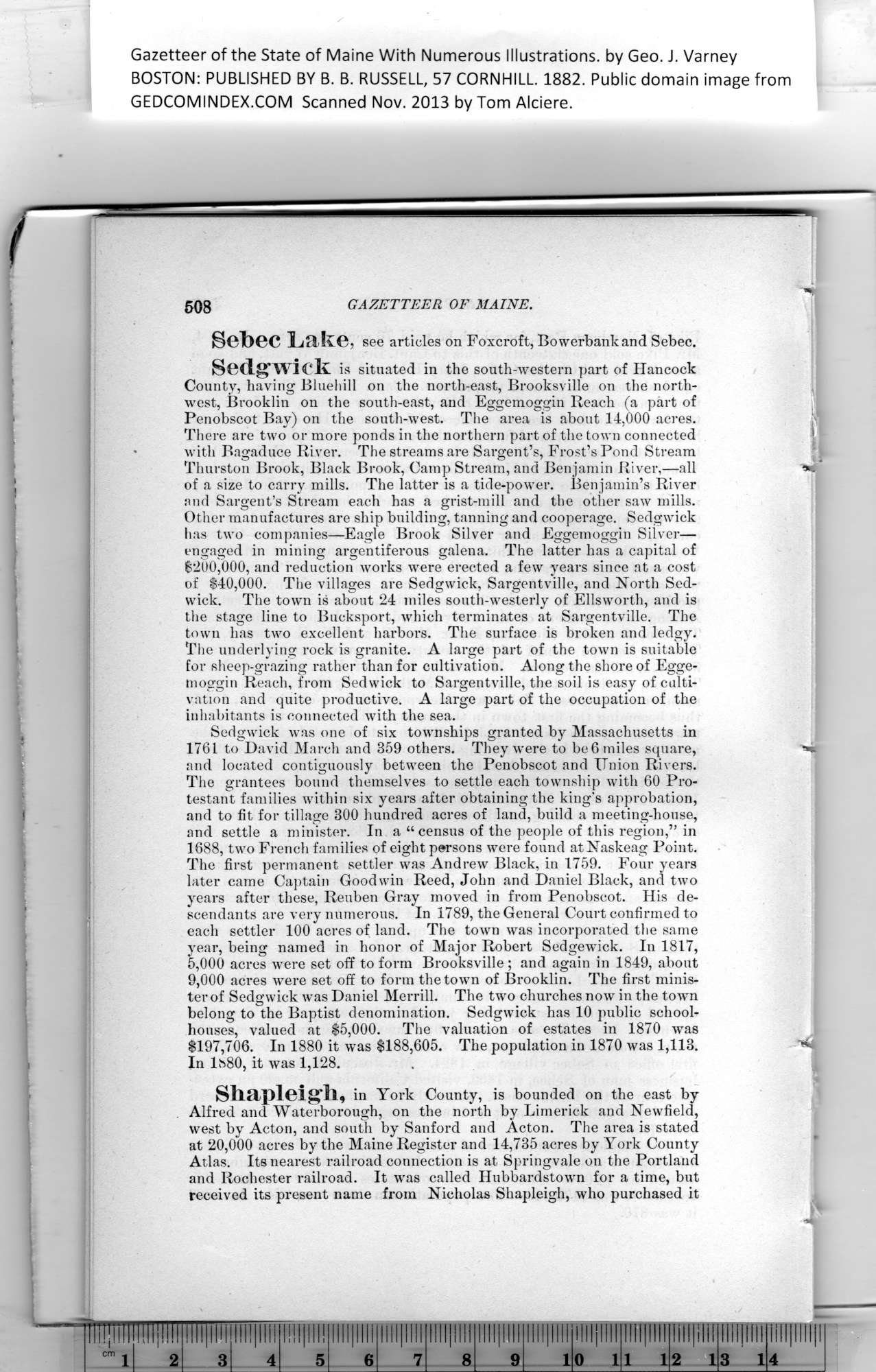|
Gazetteer of the State of Maine With Numerous Illustrations, by Geo. J. Varney
BOSTON: PUBLISHED BY B. B. RUSSELL, 57 CORNHILL. 1882. Public domain image from
508 GAZETTEER OF MAINE.
Sebec Lake, see articles on Foxcroft, Bowerbankand Sebec.
Sedgwick is situated in tbe south-western part of Hancock
County, having Bluehill on the north-east, Brooksville on the north-
west, Brooklin on the south-east, and Eggemoggin Reach (a part of
Penobscot Bay) on the south-west. The area is about 14,000 acres.
There are two or more ponds in the northern part of the town connected
with Bagaduce River. The streams are Sargent’s, Frost’s Pond Stream
Thurston Brook, Black Brook, Camp Stream, and Benjamin River,—all
of a size to carry mills. The latter is a tide-power. Benjamin’s River
and Sargent’s Stream each has a grist-mill and the other saw mills.
Other manufactures are ship building, tanning and cooperage. Sedgwick
has two companies—Eagle Brook Silver and Eggemoggin Silver—
engaged in mining argentiferous galena. The latter has a capital of
8200,000, and reduction works were erected a few years since at a cost
of $40,000. The villages are Sedgwick, Sargentville, and North Sed-
wick. The town is about 24 miles south-westerly of Ellsworth, and is
the stage line to Bucksport, which terminates at Sargentville. The
town has two excellent harbors. The surface is broken and ledgy.
The underlying rock is granite. A large part of the town is suitable
for sheep-grazing rather than for cultivation. Along the shore of Egge-
moggin Reach, from Sedwick to Sargentville, the soil is easy of culti-
vation and quite productive. A large part of the occupation of the
inhabitants is connected with the sea.
Sedgwick was one of six townships granted by Massachusetts in
1761 to David March and 359 others. They w*ere to be 6 miles square,
and located contiguously between the Penobscot and Union Rivers.
The grantees bound themselves to settle each township with 60 Pro-
testant families within six years after obtaining the king’s approbation,
and to fit for tillage 300 hundred acres of land, build a meeting-house,
and settle a minister. In a “ census of the people of this region,” in
1688, two French families of eight persons were found atNaskeag Point.
The first permanent settler was Andrew Black, in 1759. Four years
later came Captain Goodwin Reed, John and Daniel Black, and two
years after these, Reuben Gray moved in from Penobscot. His de-
scendants are very numerous. In 1789, the General Court confirmed to
each settler 100 acres of land. The town was incorporated the same
year, being named in honor of Major Robert Sedgewick. In 1817,
5.000 acres were set off to form Brooksville ; and again in 1849, about
9.000 acres were set off to form the town of Brooklin. The first minis-
ter of Sedgwick was Daniel Merrill. The two churches now in the town
belong to the Baptist denomination. Sedgwick has 10 public school-
houses, valued at $5,000. The valuation of estates in 1870 was
$197,706. In 1880 it was $188,605. The population in 1870 was 1,113.
In ls80, it was 1,128.
Shapleigrh, in York County, is bounded on the east by
Alfred and Waterborough, on the north by Limerick and Newfield,
west by Acton, and south by Sanford and Acton. The area is stated
at 20,000 acres by the Maine Register and 14,735 acres by York County
Atlas. Its nearest railroad connection is at Springvale on the Portland
and Rochester railroad. It was called Hubbardstown for a time, but
received its present name from Nicholas Shapleigh, who purchased it
PREVIOUS PAGE ... NEXT PAGE
This page was written in HTML using a program written in Python 3.2
|
